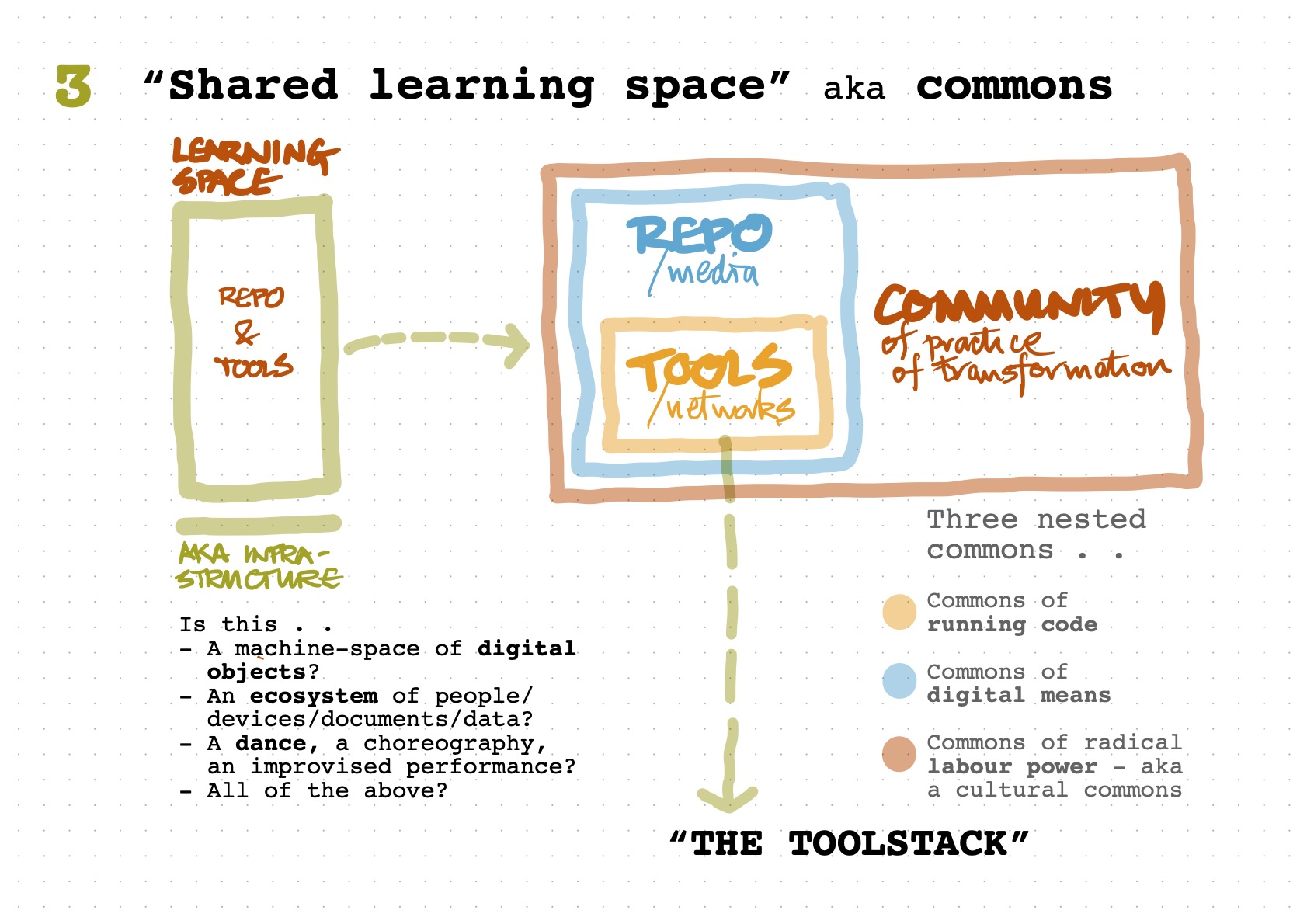Here we explore 'shared learning space' as a layered constellation of commons: of running code, of digital media, and of radical, transformative, activist labour-power.
In a discussion of digital tools and learning space, a distinction got made between three nested or layered kinds of commons: see slide below.

The nature of (digital) learning space
In the beginning there was some notion of 'a repo' or shared repository of documents, plus an ecosystem of tools for doing work with and around these media. In the slide, this got expanded.
'Tools' (and tacitly, digital networks and network architectures) got expanded to 'commons of running code'.
# Code and commoning Why commons? Bcos tacitly we're talking about the collective P2P governance of infrastructures. Commons/commoning makes this explicit and central: a bunch of resources is only an 'unregulated common pool' until it's put under explicit stewardship: then it can be a commons.
Commoning is a basic aspect of free-libre, P2P software culture - although in tangled and often diluted or marginal ways.
> See eg Nadia Eghbal
> - Ford Foundation study of 'unseen' and largely solo labour of maintenance @ gitHub pdf ![]() > - Podcast on 'working-in-public-communities' podcast
> - Podcast on 'working-in-public-communities' podcast ![]() > - Lecture on open-source and the Long Now podcast
> - Lecture on open-source and the Long Now podcast ![]()
The geek producer-culture of free code is centred on multiple-access repos of static code - even if the binding protocol is 'rough consensus and code that runs'. Whereas, we here are basically concerned with commons of running code, enjoyed - thro 'platforms' administered by sysadmins - by folks who are not primarly code hackers or server-maintainers. This is a whole other game - a whole other challenge - than the established git-culture of ur-P2P production and maintenance.
# Cultural commons, machine commons The folks who 'just use' the infrastructure of running code are more concerned with the digital media that they are able to host on the network and manipulate with the tools. Thence, the commons of digital means/media - and the stewarding of that commons - as a distinct, emergent and quite distinct aspect. This is a cultural commons as distinct from, let's say, the machine-commons of running code.
# Commons of capability aka labour power A third layer of commons/commoning then becomes apparent. In the original context of the above slide, we are talking of 'shared learning' among radicals, activists, communities engaged in transformative practice (in some kind of intrinsic relationship with digital infrastructures and P2P culture).
The core concern here is not the media or the digital infrastructure, but 'formaciòn': skilful production of capability, in P2P formations of activists, skilfully producing a radically transformed economy and culture, at extensive evolved-scale.
An important way to address this (conceptualise this) is as a commons of activist labour power. This one is the commons that matters; the other two are auxiliary - although perhaps, in appropriate forms, necessary.
-
A central problematic, then, is how to build - and essentially, steward - a layered system of commons of these three quite distinct kinds. It goes without saying that the P2P git-culture of repos of static code (even 'code that runs', in the classic hacker formulation) isn't the formula for this total challenge. So, what else? What other traditions - skills, genres, understandings, stories - have to be sung-and-danced into the practice?
This whole thing is a matter of becoming very capable in 'infrastructuring' . . but of differing kinds of stuff (including extended material practices of collectives of people as well as devices, documents and code), in commons of distinct kinds. This is a little difficult.